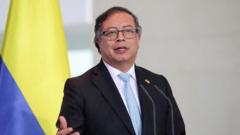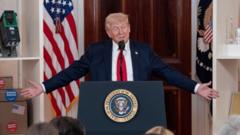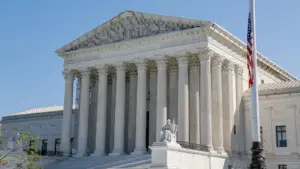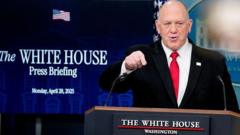Tensions escalate as President Trump imposes hefty tariffs on Colombian goods in response to Colombia's refusal to accept deported migrants from the U.S.
**Tit-for-Tat: Trump Levies 25% Tariffs on Colombia Amid Deportation Dispute**

**Tit-for-Tat: Trump Levies 25% Tariffs on Colombia Amid Deportation Dispute**
U.S.-Colombia relations fray as tariffs and sanctions follow Colombia's denial of migrant flights.
In a significant diplomatic clash, President Donald Trump has announced a 25% tariff on all goods imported from Colombia after Colombian President Gustavo Petro denied the landing of two U.S. military planes carrying deported migrants. Trump's emergency tariffs will take effect "immediately" and are set to double to 50% within a week unless diplomatic relations improve.
Petro, commenting on the rejection of the military flights, emphasized that migrants should be treated with "dignity and respect," rejecting treatment that labels them as criminals. U.S. officials confirmed that plans for the planes to land in Colombia were scrapped due to complications, prompting Trump's retaliatory measures.
In a post on TruthSocial, Trump declared "urgent and decisive retaliatory measures," which include travel bans and visa revocations for Colombian officials and their supporters. He also mentioned increased Customs and Border Protection inspections targeting Colombian nationals and their cargo, invoking national security concerns.
This sudden turn of events could have a dramatic impact on U.S.-Colombia trade, as Colombia is a major supplier of coffee, bananas, crude oil, avocados, and flowers to the U.S. Market analysts predict that the tariffs could lead to increased prices for essential imports such as coffee.
The escalation of diplomatic tensions raises complex questions over U.S. immigration policy, especially as thousands of migrants attempt risky journeys from various countries to the U.S. via Colombia. Petro disclosed that approximately 15,666 Americans are believed to be in Colombia illegally, claiming he would never engage in the harsh tactics reminiscent of the previous U.S. administration.
As the international discourse surrounding migration and border security heats up, Trump remains firm on his administration's commitment to mass deportations, citing earlier executive orders made to enhance the powers of Immigration and Customs Enforcement (ICE).
Vice President JD Vance similarly supports stringent law enforcement actions against violent criminals at the border. As the stakes rise, both countries face challenges in fostering a collaborative approach to immigration, with Trump's prior policies complicating any potential resolutions.
Petro, commenting on the rejection of the military flights, emphasized that migrants should be treated with "dignity and respect," rejecting treatment that labels them as criminals. U.S. officials confirmed that plans for the planes to land in Colombia were scrapped due to complications, prompting Trump's retaliatory measures.
In a post on TruthSocial, Trump declared "urgent and decisive retaliatory measures," which include travel bans and visa revocations for Colombian officials and their supporters. He also mentioned increased Customs and Border Protection inspections targeting Colombian nationals and their cargo, invoking national security concerns.
This sudden turn of events could have a dramatic impact on U.S.-Colombia trade, as Colombia is a major supplier of coffee, bananas, crude oil, avocados, and flowers to the U.S. Market analysts predict that the tariffs could lead to increased prices for essential imports such as coffee.
The escalation of diplomatic tensions raises complex questions over U.S. immigration policy, especially as thousands of migrants attempt risky journeys from various countries to the U.S. via Colombia. Petro disclosed that approximately 15,666 Americans are believed to be in Colombia illegally, claiming he would never engage in the harsh tactics reminiscent of the previous U.S. administration.
As the international discourse surrounding migration and border security heats up, Trump remains firm on his administration's commitment to mass deportations, citing earlier executive orders made to enhance the powers of Immigration and Customs Enforcement (ICE).
Vice President JD Vance similarly supports stringent law enforcement actions against violent criminals at the border. As the stakes rise, both countries face challenges in fostering a collaborative approach to immigration, with Trump's prior policies complicating any potential resolutions.






















